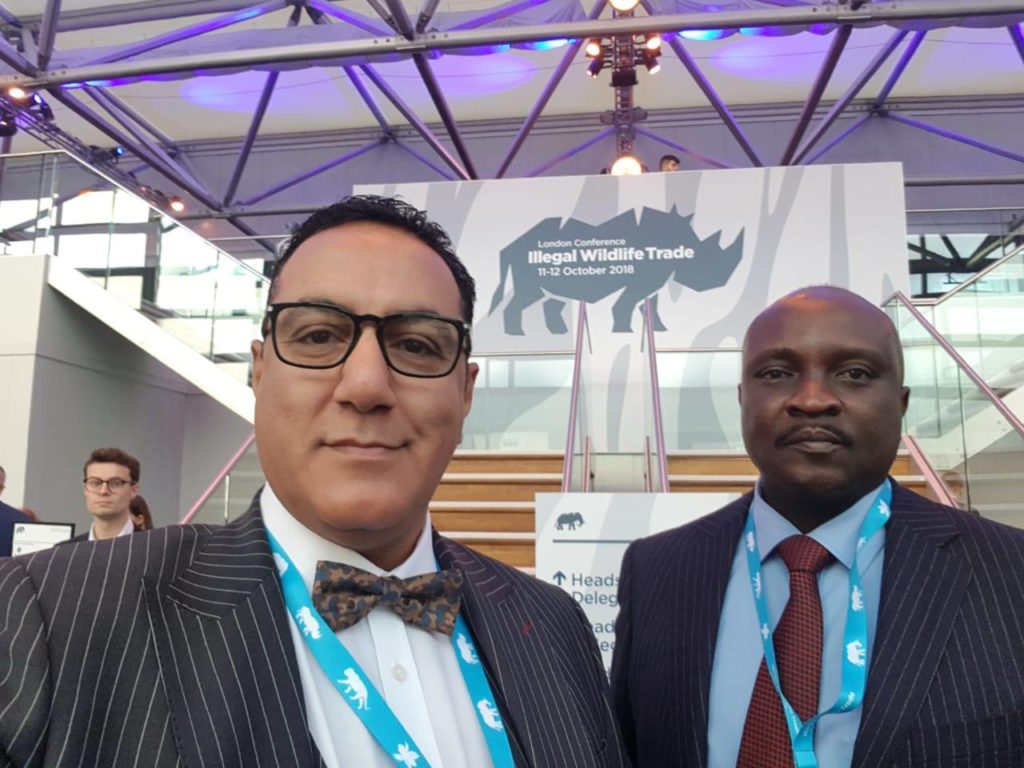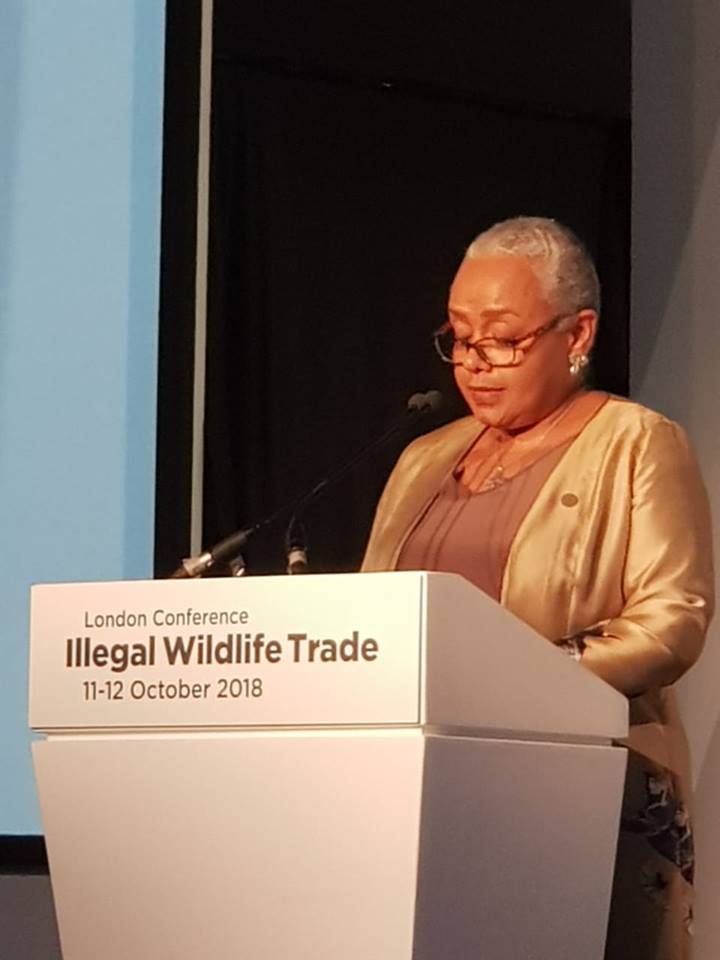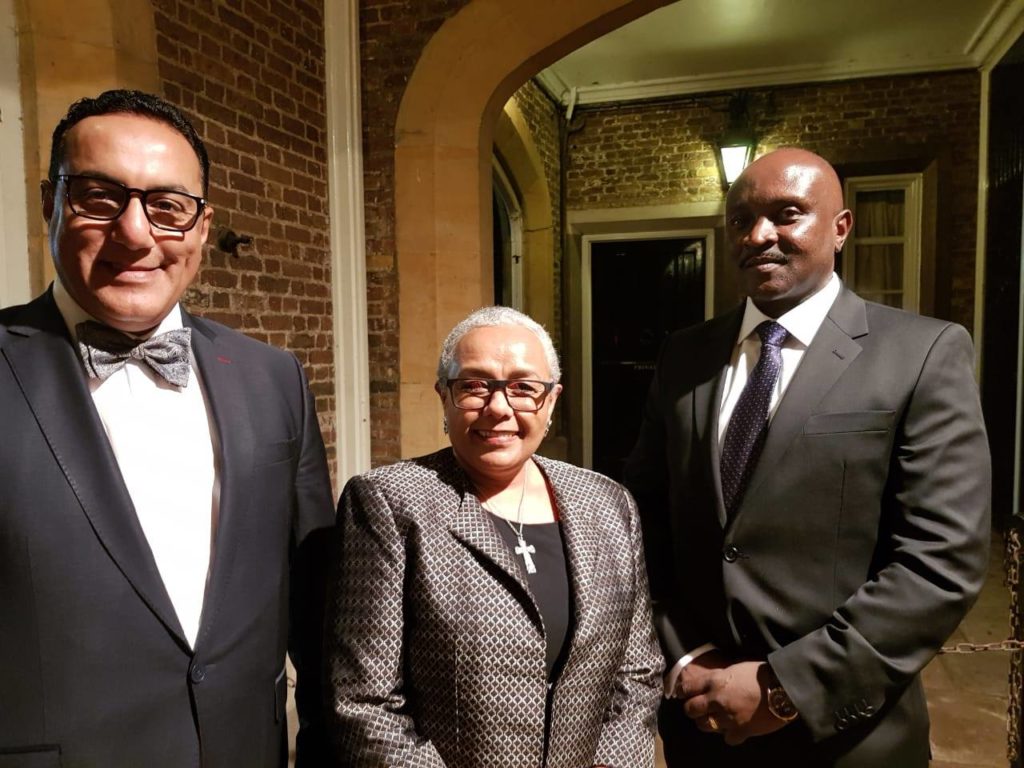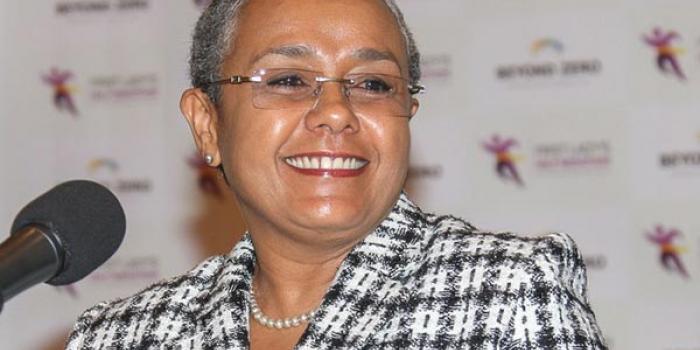Kenya is participating at the Conference on Illegal Wildlife Trade (IWT) that is ongoing in London, United Kingdom. The UK government is hosting this international conference about the illegal wildlife trade from 11th to 12th October, 2018.
The conference has brought together global leaders to help eradicate illegal wildlife trade and better protect the world’s most iconic species from the threat of extinction.
The Kenyan delegation is led by First Lady H.E. Margaret Kenyatta, who is accompanied by the Cabinet Secretary for Tourism & Wildlife, Hon. Najib Balala, Tourism Principal Secretary, Joe Okudo. Kenya Wildlife Service Acting Director-General, Dr. Charles Musyoki and other senior government officials.
In her speech during the opening session of the conference, the First Lady affirmed Kenya’s pledges and commitments to eradicate illegal trade in wildlife across the world.
She mentioned that Kenya, is endowed with some of the world most iconic species of wildlife, and the country’s participation in this Conference provides opportunity to strengthen our country’s resolve to eradicate illegal wildlife trade, to build coalitions and to find solutions to better protect wildlife. This is in line with this year’s Illegal Wildlife Trade Conference theme that calls on us to step up our efforts to change.

The First Lady stated that change involves brokering agreements between diverse stakeholders of similar conviction to stand together in a cause we believe in.
“The objectives of this Conference resonate with Kenya’s pursuit for sustainable development which requires diverse interventions to protect our natural habitat. It requires building highly capable and functional institutions as well as putting into place robust policies supported by commensurate resource allocation. It also requires us to consider new and innovative ways to combat sophisticated crime triangles and more research to inform practical policy interventions and to raise public awareness,” said the First Lady.
She added that Kenya has been able to reduce the level of poaching of iconic species considerably in the last three years.
“Our elephant population currently stands at over 34000 while the rhino population stands at over 1,000. These are the fourth and third largest country populations in the world respectively. In recent years, we have seen a notable decline in poaching in Kenya largely, due to enhanced wildlife law enforcement efforts and Government investment in anti-poaching. We have revamped and improved training and equipped Kenya Wildlife Service ranger forces that continuously evict poacher elements from the Parks. We have also strengthened collaboration with institutional networks and law enforcement agencies on fighting wildlife crime including the Judiciary, alongside local, regional and international stakeholders and most importantly, local communities”.
H.E. First Lady Margaret Kenyatta’ further commented:
“Kenya is committed to eliminate markets and reduce demand for illegal wildlife trade through burning of ivory and rhino stockpiles. We have found it to be an impactful technique to deter the poaching of elephants and suppressing illegal ivory trade. Since 1989 to date, Kenya has burned a total of 137 tonnes of ivory and 1.5 tonnes of rhino horns.
Kenya is a key transit hub within the region to international destinations. Various illegal wildlife specimens, mainly elephant ivory, rhino horn, pangolin scales are transited through our ports. However, the application of strong and deterrent prison sentences have worked well to reduce Illegal trade in Wildlife.
In addition, we have enhanced cross border collaboration within the region and made appeals on a global front to encourage countries to join our efforts to close market demand for illegal trade. We congratulate those countries who have pledged their support towards this effort.
Nonetheless, illegal trafficking of ivory, rhino horn, pangolin scales, among others, still persists through various sea and air ports.
This is a setback to our resolve and determination to completely wipe out illegal trafficking and sale of wildlife products in order to attain zero poaching levels.

To this end, we have identified five critical areas that require support from our wildlife conservation partners to enhance our law enforcement capacity to deal with illegal wildlife trade. These areas include:
• Enhancement of capacity of our forensic laboratory to support law enforcement leading to successful prosecutions;
• Improvement of our stockpile management system;
• Enhancement of our law enforcement at ports of entry and exit;
• Human-wildlife conflict mitigation; and
• Establishment of the population status and distribution of Pangolin, which is fast emerging as a highly-traded species.
The Kenya Government intends to step up its enforcement efforts to tackle this organised crime by supporting internal law enforcement efforts and further by collaborating with local communities to increase their investment towards protection of our iconic species.
We call on every effort to enhance our intelligence and investigation networks to win this war.
To this end, Kenya further plans to enhance Conservation Education by holding programs with key stakeholders, in-order to mitigate human wildlife conflicts and enhance wildlife-human co-existence. We applaud the work our media has played in profiling stories and supporting advocacy campaigns within local communities.
Kenya is planning to host a conference dubbed “Elephant Naming”. This is an initiative that aims to source for more space for elephants hence enhancing revenue for communities living in and around one of our premier national parks – the Amboseli National Park. I extend an invitation to our goodwill ambassadors, partners and ardent conservationists to attend the naming ceremony.
I look forward to adding Kenya’s voice to support our joint pledge towards this global fight and to reaffirm Kenya’s commitment at all levels to support the IWT Conference Declarations at the conclusion of this Conference.

Kenya’s pledges at the London Illegal Wildlife Trade Conference 2018:
1. Kenya commits to strengthen law enforcement at key ports of entry and exit to check for any illegal trafficking of trophies through the country and apprehend any offenders perpetrating this crime.
2. Kenya is committed to enhance inter-agency cross border collaboration in illegal wildlife trade at all points of entry and exits for concerted efforts in fighting illegal trade in wildlife trophies
3. We shall strengthen scene of wildlife crime management for enhanced investigation and prosecution of illegal wildlife trade cases hence increasing conviction rate for wildlife crime offenders to ensure the stiff penalties provided for by our Wildlife Act 2013 is achieved.
4. Kenya will continue enhancing the use of the Canine Unit power and other new technologies to address ivory, rhino and pangolin smuggling.
5. We are going to modernise intelligence operations to ensure that intelligence operators embrace appropriate technology while collecting and analysing intelligence aimed at disrupting poaching syndicates and trophy trafficking networks.
6. We shall soon conclude the process of establishing the population status and distribution of the pangolins, which is emerging as a highly traded species. This is in line with the resolutions adopted at the 17th meeting of the Conference of the Parties to CITES (CoP17, Johannesburg, 2016) where all eight species of pangolins were transferred from CITES Appendix II to Appendix I. This will enable Kenya put in place pro-active strategies to safeguard and increase the population of this endangered species
7. In efforts to enhance investigation and prosecution of wildlife crime cases, Kenya will continue to build capacity its staff and gazette more wildlife crime prosecutors and scene of wildlife crime officers. The operationalization of our forensic and DNA laboratory will provide additional leverage in prosecution of wildlife crimes cases.
8. Kenya is committed in working with its neighbours in addressing cross border wildlife crimes through bilateral agreements and jointly within the regional enforcement mechanisms like the Lusaka Agreement Task Force (LATF) and Wildlife Enforcement Networks (WENs).







